The commercial multiplex after switchover: ArqA, ArqB and SDN
 Brian Butterworth published on UK Free TV
Brian Butterworth published on UK Free TV At a significant, but minority, of transmitter sites, the three commercial multiplexes, and in particular ArqA and ArqB are often held at low power for many months following the digital switchover.
The old analogue network
The following graph shows the allocation of the old analogue networks, in effect on the day before digital TV was first introduced to the UK. Along the bottom is the channel numbers from C21 up to C68, with each network coloured coded and the height of each bar representing the number of homes served.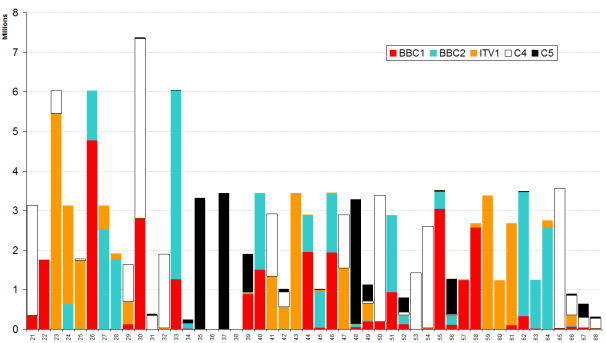
There are 45 frequencies available (C36 was for RADAR, C38 for radio astronomy). The analogue network needed 10 frequencies per network, so in effect there are "four and a half" analogue networks: Channel 5 has less than 100% coverage.
Some frequencies were allocated exclusively to a network: C22 is used at 114 sites for BBC One analogue to 1,752,564 homes; C59, C60 and C61 at 85, 91 and 96 sites for ITV1 to 3,366,782, 1,232,976 and 2,569,576 homes, C35 and C37 are 12 and 10 Channel 5 analogue sites to 3,314,000 and 3,432,000 homes.
Another use of the frequencies is to divide the coverage into two services, such as C33 where 5 main transmitters serve 4,773,899 homes with analogue BBC TWO, but also 80 relay sites use it for analogue BBC One to 1,254,378 homes.
Finding space for ONdigital
The reason about 10 "total" frequencies are required for each full analogue network is the Inversion Effect - during certain weather conditions the analogue television signals would travel much further than usual as they bounce back to the ground due to a layer in the atmosphere acting like a signal mirror.These generous allocations allowed, back in the 1990s, the planners to provide low power digital services. This is because the system used for encoding the digital services, COFDM, looks like "snow" to an analogue service. Under inversion conditions, if the digital services "leak" to other areas, they will cause a small amount of snow to appear on an analogue picture, and COFDM has a number of systems built into it to reject interference from analogue.
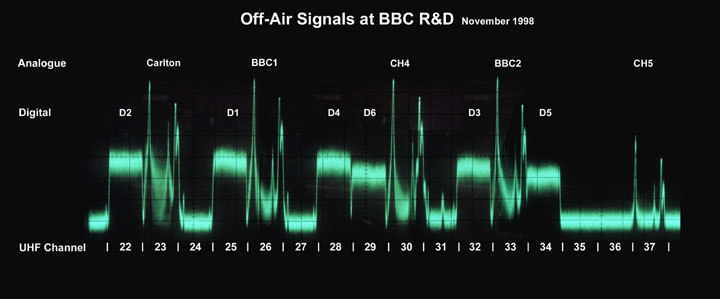
This diagram shows an "analogue view" of the digital services - they appear as "noise" that will degrade an analogue picture by making it snowy.
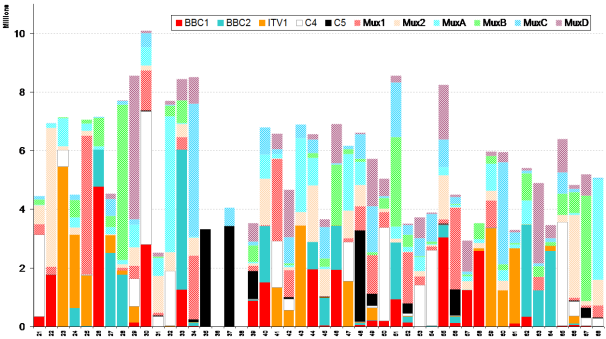
By accepting that the digital coverage would not match the analogue service, both in terms of the number of transmitters (just 80 main ones), and the power output levels from these transmitters, and also by using carefully calculated radiation patterns (meaning the signal does not broadcast at the same level in all directions), ONdigital was able to provide a service.
Digital switchover
To provide the digital services to all homes in the UK it would then become necessary to close the analogue services and reallocate the frequencies.The diagram below shows how this has been done.
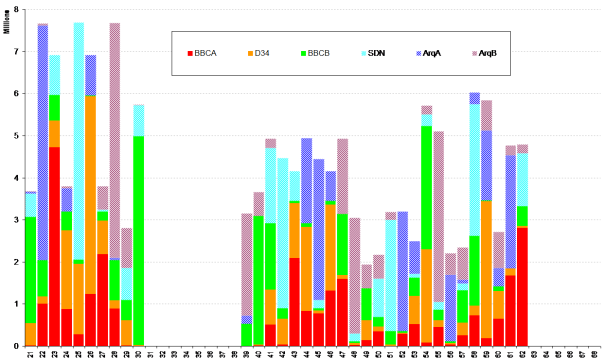
Some frequencies have been reallocated to other purposes - such as C61 to C69 for fourth generation mobile phone services, the so-called "digital dividend". (Note that C61 and C62 are shown as allocated in the diagram as the transmitters using them will be shuffled to C39 and C40 before the 4G services launch, C31-C37 are being returned to digital TV in 2012-15).
In general this means that three of the analogue network plans have been kept, and allocated to the public service broadcasting multiplexes: BBCA, D3+4 and BBCB (which is Freeview HD). This was necessary - it means that these multiplexes remain "in group" at all transmitters, so reception of these is possible without changing an existing aerial.
This means that the space for the three commercial multiplexes SDN, ArqA and ArqB have been reallocated into the effective "gaps". For this reason, the coverage of these multiplexes is much like the three most powerful multiplexes before switchover.
For this reason, whilst the network is being changed between the analogue/digital to digital-only network it is often necessary to keep the power levels for the commercial multiplex on low power, or to assign them to other temporary frequencies.
As you can see from this diagram, the outcome is that most of the main 80 transmitters will provide lower coverage for all services (light green) than they do for just the public service multiplexes (dark green).
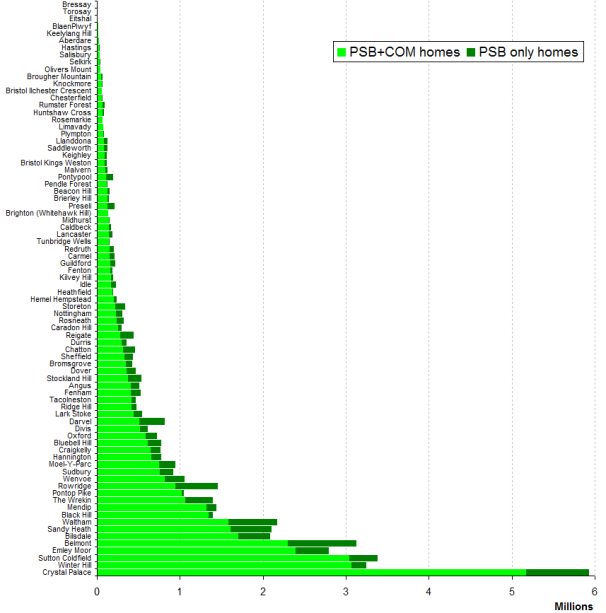
Help with Freeview, aerials?
In this section
Thursday, 8 September 2011
P
Philip Crack6:35 PM
please could you explain to me why i cant receive film 4 or yesterday channels as i have just erected a brand new mux tri boom aerial expecting to pick up all channels.I live in Kettering Northants and use the Sandy Heath Transmiter.Will i be able to receive these channels at some later date.Thanks for your help.
| link to this comment |
Philip Crack: "Arqiva B will temporarily move to channel 67 (at 20kW ERP) at switchover and then it will adopt its final allocation of channel 48 on 14 Sept 2011."
| link to this comment |
Wednesday, 2 November 2011
K
karen9:34 PM
i lost film4 and a couple of other channels last week. there's nowt happeneing at the sheffield transmitter but i did find info that, on 25th oct,they did something to the 'ArqB'. i'm assuming that this is what 'did' for the channels! now, i've no idea about the muxs/arqs etc, all i want to know is - do i need to retune AGAIN? scared to try incase it makes it worse......don't trust the digiboxes!!
| link to this comment |
L
lee s10:51 PM
Leyland
i like karen have lost yesterday and film four and a few other channels just wondering what the hell is going on !!! i'm using a BTvision box and a signal booster !!! not a happy bunny digi tv not all it's cracked up to be better signal when it was analogue specially when i only live five miles to the west of the winter hill transmitter!!
| link to this comment |
lee's: mapL's Freeview map terrainL's terrain plot wavesL's frequency data L's Freeview Detailed Coverage
Thursday, 3 November 2011
lee s: I would start by getting rid of that booster - see Freeview signals: too much of a good thing is bad for you | ukfree.tv - independent free digital TV advice .
| link to this comment |
karen: Yes, you have to do a "first time installation" as before.
| link to this comment |
Monday, 30 April 2012
P
P Thompson10:03 AM
Rotherham
My daughter although living within six miles of the sheffield transmitter is tuned to the belmont one because her house is in a dip. After switchover she received all the stations she expected for about 4 months. She has since lost certain stations which according to the multiplex list were on channel 53. Sometimes these dissappear for up to 10 days and then after a retune return for a few days and disappear again. I live half a mile away but am tuned to the sheffield transmitter. I sometimes have the same problem but not always at the same time.Both the televisions we have have integrated freeview but different makes. Retunes have been made both as automatic with the aerial removed to clear everthing and a manual retune on channel 53. This always comes up as No signal. Any ideas please. Her postcode is S61 1LH.
| link to this comment |
P's: mapP's Freeview map terrainP's terrain plot wavesP's frequency data P's Freeview Detailed Coverage
P Thomson: The thing with Belmont is that it used to be Group A only, but is now wideband due to the use of C53 and C60.
Has your daughter's Group A aerial been replaced by a wideband one? Does the signal strength on C60 (Yesterday etc) show as being markedly lower than that of BBC One, ITV1 and ITV3?
If there is manual tuning, tune to C53. See if on the screen it gives you an indication of the level of the signal. Maybe it is just below that needed to work.
The Sheffield transmitter is "semi-"wideband and was wideband for analogue Channel 5, so you may have had your aerial replaced for a similar reason.
| link to this comment |
P Thomson: The Blackburn relay uses C53 and C60. It is next to the M1 and beams its signal to its north west. I wonder if this is the problem.
| link to this comment |
P Thomson: It is only 2W to its north west!
I'm not sure whether that might have an affect at 1.4 miles off-beam of the main signal. Just a thought anyway.
| link to this comment |
Select more comments
Your comment please!